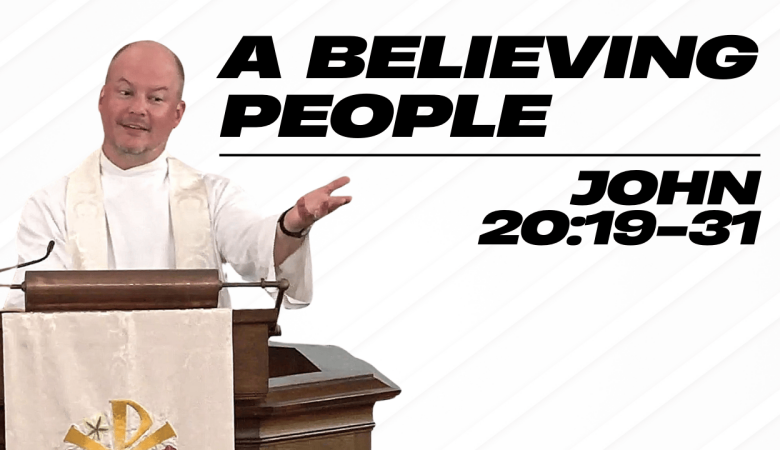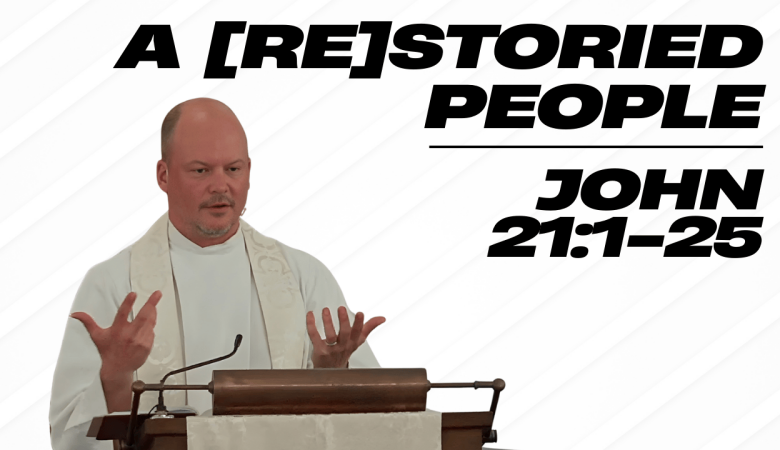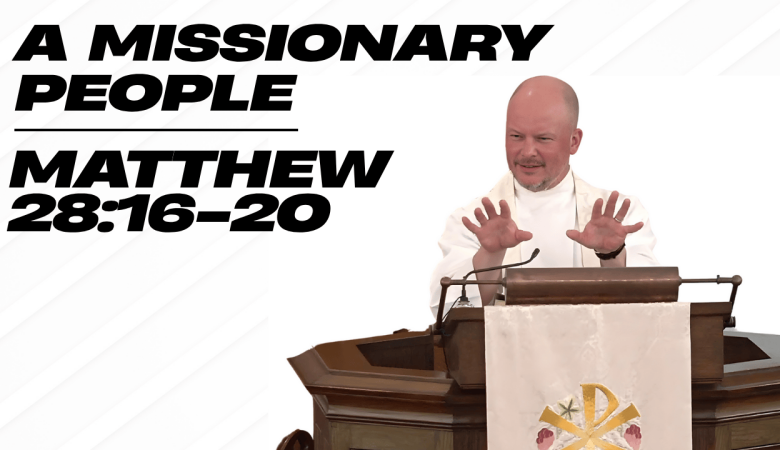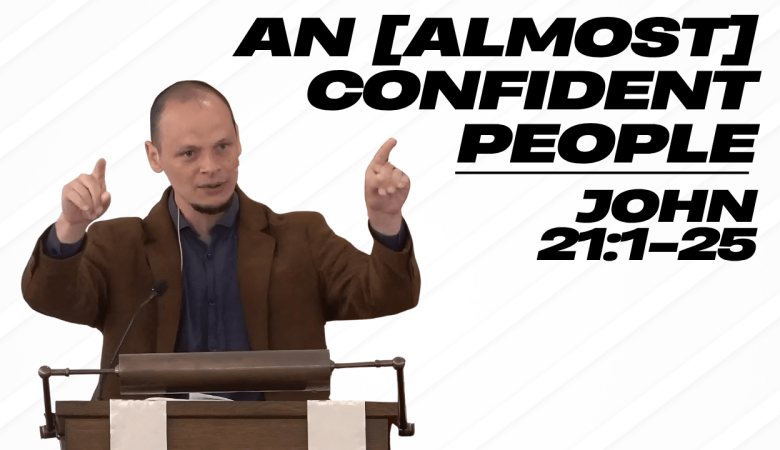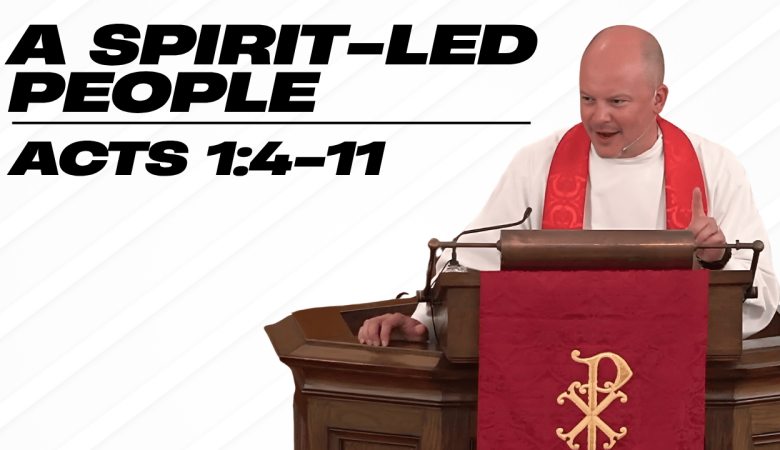Series: Resurrection Narratives
People of the Word
April 27, 2025 | Peter Rowan
Summary
Jesus post-resurrection narratives have a lot to say to us as a church. In this dramatic passage of Jesus with the disciples on the road to Emmaus, we find emotional swings, drama, humor, but what we see clearly is an emphasis on the words of Christ. The disciples then, and we now, hear the questioning words from Jesus, the given word from Jesus and the suffering word in Jesus.
Transcript
Thanks be to God. Let's pray. Lord, we bless you. And we praise you, Lord, for freeing this sister who is seeking to care for these women. God, I pray that you will do a great work even through her short imprisonment.
God, that through her suffering, Christ might receive great glory. And God, even through this answered prayer, that we, your church here, all the way around the world, might devote ourselves more to life with you and to laying our burdens before you and finding in you that our despair is turned to hope, that our sorrows can be turned to joy. God bless us. Now, as we look at this resurrection narrative or through this news, I feel like our hearts, at least my heart already feels like it is burning for you to work. So I pray that you would do that now.
Amen. All right, you just heard from Melise is one of my favorite passages in the Bible. And I know I say that occasionally, but it's true. I can have multiple favorites just like you can. This is one of them.
I love this story because it has some suspense to it. It has some sorrow and grief. It also has some humor in Always seemed a little strange to me that Luke is the only one that recounts this story. It's just so wonderful. Most likely because he tells us actually in chapter one, that one of the things that he's doing in his Gospel is he's trying to give a true account of the things that happened.
And he interviews people and all these kinds of things. And he mentions Cleopas here, probably because he had interviewed Cleopas. Hey, what are some of the stories of Jesus? And Cleopas probably said, hey, I've got a good one for you. Tell you about our walk back to Emmaus.
I think it's just such a wonderful story, and that's why you've heard it a few times from my lips. We've looked at this story a few times together. And so when I was preparing for it, I searched some of my old sermons. And this is where it's a little embarrassing. And last year, on this very week, I preached from this passage.
And I didn't remember that. I was like, how are you supposed to remember what I'm saying if the words from my own mouth seem to go out sometimes and they die in my own ears? I preached this passage not once last Easter Tide, but twice the second week of Easter, which we are on today, and the third week of Easter. Anyway, I am not going to give you my sermon from last year, partly because it just doesn't work that way. In case you're wondering, I've Never actually gone back and been like, wow, that was really great.
They need to hear that again. But I am going to give you a similar introduction and tell you something that I said last year. So what I want us to do in this Easter tide is I want us to look. Actually what we're going to do is we're going to look at some of the resurrection narratives, the post resurrection narratives of Jesus, and then also through those stories say, who are we to be as a people? What does it mean for Second City Church?
And what are some of our priorities in light of Jesus post resurrection interactions with his disciples? Okay, so this morning we're going to consider this idea that we are to be the people of the word. And you can think about the power of words, especially in light of me not even remembering that I preached this text twice last year, last April, this very month, a year ago. Here is the shortest of Emily Dickinson's poems, which I gave you last year. Also it's called the word is dead.
A word is dead when it is said, some say. I say it just begins to live that day. Since it's so short, I'm going to read it twice. A word is dead when it is said, some say. I say it just begins to live that day.
And what I suggested you last week is that that tends to be true of most words, almost all words, significantly powerful words. But then actually the odd thing is that my own words seem to die in my own ears. But my encouragement to us is to actually interact with the living word, the real word, as it comes to us from God the Father, the Lord Jesus Christ and the Holy Spirit. So think with me about the scene that we have in Luke chapter 24. Think about the story.
What we have is we have this couple walking back to their home in Emmaus. It says about seven miles away, about seven and a half miles. We know today some people think that this is Cleopas. Actually Clopas is, is the name given to us in John, chapter 19. And his wife Mary.
So Cleopas is mentioned here. It's very possibly that it's Clopas and his wife Mary there in John chapter 19. But you can sort of feel just the dread as they walk back, the slow plodding of their feet as they make their way back home, having celebrated the Passover, having spent time with their Lord. And if it's true that that's who they were, then they were actually at the very cross of Christ. When Jesus tells John, you know, there's his mother and Mary, and Mary there's your son.
To John, the disciple John. You can imagine their dismay and the failure of their hopes. They had seen Jesus there on the cross, and so they're talking about these things that they had witnessed. And again, think with me of this week. This week began with a triumphal entry.
Remember that we reenacted in a slight way as we wandered around our building and up through our stairs and into this sanctuary. And they had thought probably. They probably thought, here's the king, here's the new ruler who's going to put the world to rights.
And yet as that week continued on, their hopes were dashed. The one who would bring the kingdom of God crucified. You know, they had probably heard the stories of the Last Supper at the very least, maybe it's very possible that they were actually there in that upper room. We don't know that it was just the disciples. We know it was at least the disciples, but there they were.
They had probably heard the story of the disciples fleeing in the garden. Maybe they'd heard of the 30 pieces of silver that Judah just 30 pieces of silver that he betrayed his Lord with, how he had gone and hung himself. Certainly what they were talking about, they were probably talking about all these things, but almost certainly what they were talking about was the crucifixion of Christ. That was probably the central thing that they were talking about, that their lord, their teacher, their would be king, died on a Roman cross. And the odd thing probably they were talking about is their own religious leaders that instigated it.
And it was the very power that they at least hoped would be overthrown in the Roman Empire that brought it about with their evil cross. There was so much to talk about, but here's what's certain about this walk and this long walk home, this slow walk home, that of all the things that they were talking about, it was something that took away all of their hope, all of their joy and only brought despair because they were headed back to a world where sickness, just like our world, seems rampant, where work seems to be more life taking than life giving, where, you know, they're worrying about how are their kids going to grow up, Are they going to follow Jesus to the end? Where people move in and out of their lives, they put all their eggs in the basket of Jesus and it seems as though the cross was the Easter bunny who sat on them. If you, you will. Life with our bodies and our minds don't seem to work.
Where our relationships so rarely have the kind of intimacy that we desire and long for and were made for. Just say they're going back to a life like our lives, right? One that you and I know.
But then they encounter the Word. And oddly enough, it seems as though their slow trotting to Emmaus turns them around to run back to Jerusalem. At the end, they encounter the Word. And I want us to just look at how they encounter the Word and then encourage us to say, this is how actually we are invited to be people of the Word. Okay?
So the first way that they encounter the Word is actually, I'm titling this. The questioning word. Okay, the questioning word. First they encounter the questioning word. So please open your Bible, grab that Bible in the pew in front of you. It's on page 1051.
So here's the thing. For all the times that I have preached this text, I have never pointed out, and I don't even know that I have exactly noticed that in all of these verses, From Luke chapter 24:13 all the way to Luke chapter 24, verse 35, in all 22 verses, the only times that we hear the actual words of Jesus other than his rebuke are in questions.
We're never given what we kind of want, right? What we want. Well, we're going to get to this in a second, is the great details of the Bible study, right? Instead, what we get is Jesus questions verse 17. Look down there with me.
And he said to them, what is this conversation you're holding with each other as you walk? And I love this. And they stood still, looking sad. They're just. I mean, they're just taking it in, just asking us a question.
But this is what questions do, right? They invite contemplation. Actually, maybe that question was exactly what they needed to hear to get them to pause for a moment and to sit in the sadness of what had taken place and to contemplate. So then the next verse, verse 18, then one of them named Cleopas answered him, are you the only visitor to Jerusalem who does not know the things that have happened there in these days? And verse 19.
And he said to them, what things?
Now keep in mind, y'all, we are talking about the risen Christ, the long awaited Messiah. He just conquered death. He paid the debt of our sin. He conquered the powers of darkness.
Does Jesus know what conversation they are having? Yes, I would bet on it. Does he know the things that have just happened in Jerusalem? Yeah, he's like at the center of it all. No doubt.
I mean, if indeed this is the Clopas and Mary who are mentioned In John chapter 19, he had just seen them a few days earlier. They were one of the last people he saw before he died. And yet Jesus questions them. It seems as though this is his desire for them to ask questions so that he's not just stating, here's what you got to do, here's what you got to believe.
The truth is that a word can often be dead in a way, if it is just a statement.
But a question invites more life, more participation, right? More dialogue and reflection and response. A question brings forth life, whereas a statement so often dies.
Not one of my favorite playwrights. I remember reading him years ago, the absurdist Eugene Yojan Ionesco. His French playwright wrote, it's not the answer that enlightens, but the question. And he's right. Jesus rarely gives answers.
Have you noticed this? Sometimes it's almost annoying. Jesus just answered the question, but he wants our participation. He wants our life with him. He asks questions.
Think about this. The very first thing that Jesus says in the Gospel of John is a question. What are you seeking?
What a way for the word who is made flesh to first engage with others. What do you desire? Would you say? What are your hopes? What are you seeking?
Jesus questioning us? Not just them. Long ago and interestingly, I actually read this week that if you count them all up through the ministry of Jesus, There are nearly 300 questions that Jesus asks. Let me give you just a few of them. Why do you worry about clothes?
If you love those who love you, what reward will you get?
I'll just stop right there. Aren't those questions still pertinent today? How we obsess over the things that we have? Or how we just want to love those who think like us and act like us and disdain those who are different? Here's another question of Jesus.
Why are you so afraid?
Another one. Why do you doubt this great question that I hope you are all wrestling with and inviting others to wrestle with? Who do you say that I am?
And genuinely, we could go on and on, and our whole sermon could just be me asking questions that Jesus asks us. But this shouldn't be any surprise for us, because what does God himself do after Adam and Eve first sinned in the garden way back when in Genesis, chapter three? But he asks him a question, where are you?
Where are you in relation to me?
Friends, for all the questions we may have about God, what's most important actually is that he is asking us questions.
And I want us to be a people who invite the questioning word. Because what God is doing in Christ and asking these questions Is he's inviting us into actually dialogue with him and life with him and an ongoing life with dialogue. That's what questions do invite into relationship.
And let me say this, okay? The questioning word does come to us through the scriptures. I just mentioned that the gospel writers give us nearly 300 questions from our Lord himself. But often actually the questioning word comes through the body of Christ living the church, right? You together.
So often the questioning word comes to us over cups of coffee with a friend, right? Or in our small group settings or whatever, right? Questions like this, what hopes have dashed your life today? It's not just back then, but it's in the questioning of our life together now. Where are you finding joy?
Which is another way of saying, what do you desire? What are your hopes? I mean, ask each other, who do you say that Jesus is? Invite dialogue through the body of Christ. It's the application we can have, right?
Invite thoughtful questions.
Because what we see actually, and this is what happens, right, is through these questions, Jesus just says, what things? And what happens is that their initial right, they stood still, looking sad. That's what happens after their first question. And then Cleopas speaks up. Well, after their second question, they begin to recount, right?
Concerning the things of Jesus of Nazareth, the man prophet, mighty indeed. And it keeps going on for a little while. They actually begin to open up as the question is posed to them. Life, participating in life comes out of these questioning words from God.
And yet there is a moment here or sort of a movement to another commitment that I hope we have with regards to the Word. So I want us to be a people that invite the questioning word, but I also want to be us, to be a people who sort of investigate the given word, okay? And that's sort of our next thing, the given word. So Jesus asks this question in 19, what things? And then, you know, Cleopas opens up and he recounts what had happened in Jerusalem.
And then in verse 24, it ends like this. Some of those who were with us went to the tomb and found it, just as the woman had said. But him they did not see, which is why they're making their way home, right? And Jesus then says the one non questioning statement he says in this, in this passage, verse 25, he says this, O foolish ones. Which is how he treats his disciples sometimes, right?
You might remember a few weeks ago, he said, O you little faiths, O foolish ones. And slow of heart to believe all that the prophets have spoken. Which is to say that as a people, we can't just be A people that are committed to the questioning word, to dialoguing with Scripture. But we actually have to be a people who are open to the given word, to receiving what God has given us. Right?
I hope you see the difference there. There's the invitation to a questioning word. But then we're supposed to actually investigate what is it that God has actually said? How has he already communicated himself? So then Jesus gives this Bible study that we all wish we could have been a part of, that we get no details of here.
Jerusalem to Emmaus is mentioned. You know, it's nearly about seven miles, and I imagine sort of a slow, plodding walk if they're downtrodden, talking about the suffering of their Messiah. And So maybe it's three hours long. And in these three hours, we're told in verse 26 that beginning with Moses and the prophets, he interpreted to them in all the Scriptures the things concerning himself. And we could go over these things together.
That might be profitable. But we could talk about the suffering Christ through the lens of the sacrificial system of the Old Testament. We could talk about David. Now, he was the great king who looked for the greater king, like in Psalm 2, or how his psalms so often pointed to the suffering reality of this life and how they're to be offered up as prayers to God to be received. And we could talk about the suffering of Israel through the deportation and the exile and all that.
But part of the point that I want us to see here is that Jesus is saying, you need to search the Scriptures. Be a people that are devoted to the Scriptures. He says, oh, foolish ones, did you not know that it was necessary? And then he opens to them. The Bible questions are good.
I hope we all learn to be good askers of questions. Bringing your questions to God is good. Letting God ask you questions is deeply, deeply important.
But we must be a people of the Word who are devoted to the study, to the memorization, to the contemplation of what God has revealed, what he has given to us in the Holy Scriptures. Second Timothy tells us all Scripture is breathed out by God and profitable for teaching, for reproof, for correction, and for training in righteousness, that the man of God may be complete, equipped for every good work. What I'm telling you is I think one of this resurrection narrative here is Jesus inviting us into receiving the Word through questions. But he's also saying, do you study? Do you know what it says?
Do you understand? Have you given yourself to contemplating the Word that I have already given to you?
One of the things I think you'll quickly notice if you've been around Second City for a little while is that we are people of the given word. If you just look through your liturgy, what most weeks we have about seven or eight scripture passages, and they are intentionally from all over in the Bible. All scripture is breathed out by God and profitable.
I want to encourage you to devote yourself to the study of Scriptures. Maybe start by joining. There's some of us that are reading through the Bible in two years. Okay. So it's just a couple chapters a day.
If you're wondering, kind of like, where do I start? Just jump in where we are. If I would have said that a month ago, you might have stopped in a week because it was a pretty tricky part. It's getting a little bit easier. It's soon going to get a little more easy.
Jump in with us, Maybe take on this challenge. Okay. Every month we have this scripture passage that we encourage the children to put to memory. What if this year you said, I am going to memorize all of those, I'm going to put them to memory, and you just devoted yourself. I'm going to memorize the Word with my kids or with my friends.
I'm just going to ask. We're going to devote ourselves to the given word of God. Maybe ask a few other people to read the Bible with you. Just get together and read, talk about it some, but mostly just read. Devote yourself to the given word.
What I'm saying is that we, as a church, if we look at this resurrection narrative, what we should actually desire is to be people of the Word and to invite the questions of God into a life with God, but to understand that the given word of God is still effective. It's still life giving, useful for correction and reproof and for teaching and for training today. All right, finally, what I want to suggest to you is that this text invites us into being a people of the suffering word. Okay? The questioning word, the given word, and the suffering word.
Again, I think it's really interesting that what we have from the words of Jesus, we have in this beautiful passage, there's three questions and then there's a statement. And the statement isn't the one that we normally want to hear from Jesus to his disciples. Here's these dejected disciples. They're kicking the rocks on their way back to town, just like wondering what's happened. All their hopes are dashed.
And you sort of want Jesus to just come around and be like, guys, look at me. It's me instead. Verse 25. He says, oh, foolish ones.
Not exactly the Jesus that we all picture. But he says, oh, foolish one, slow of heart to believe all the prophets have spoken. And he says, was it not necessary that the Christ should suffer. Was it not necessary that Christ should suffer these things and enter into his glory? Anyway, he gives them this great Bible study, and they draw near to the.
To the village. And probably one of my favorite details of this story, what I find very humorous is it says that he acted like he was going to go further. And I just want you to picture Jesus acting.
I wonder how slow he walked, or if he was like, all right, I'm moving on. What are you going to do? And then they invite him in, but while he's at table with them, right?
They invite him to be at table with them. And it says in verse 30 that he took bread and blessed it and broke it and gave it to them. Which is exactly what is said just two chapters earlier, when Jesus is in the upper room with his disciples, and he takes bread and he blesses it and he breaks it, and he gives it to his disciples. And it's. And he says, this is my body broken for you.
And it's in that moment of reenacting the reality that his body is broken for his disciples that says that their eyes were opened. Their eyes were opened. They realized they recognized him when he was taken, blessed, broken and given. Which is to say, it is in the remembrance of the suffering reality of the Word made flesh that they actually see properly Jesus and they understand properly their place in the world.
Look with me for a moment at the image on the front of your bulletin.
This is a famous picture by Caravaggio.
I want to draw your attention to the man on the right. There's a lot of wonderful things that are happening in this story. This is called the Supper at Emmaus. But the man on the right is reaching his arms out. And what I read is he's reaching his arms out in astonishment.
But you could also see that he's reaching his arms out actually in the shape of a cross. And imagine if this man was Cleopas, he would be doing this both in this wonderful way of saying, wait, what has happened? But wait, I remember that you're the one whose body was broken. He's saying, you are the one that was hanging out on the cross just like this. And now you're alive right before me.
His whole being, as it were, is receiving Jesus as the suffering word. What I'm saying is that you cannot just. And it's at this moment that they actually understood and that their lives were changed and that they run back, tell others. Because you cannot just receive Jesus as the questioning one. It's kind of fun to dialogue with God.
Maybe most people who are interested in spirituality will maybe say, oh, let's question who God is and allow him to talk to me, and I'll talk to him and let's have a dialogue. That's good. Jesus invites us into that. And it's not enough just to sort of know what the Bible says, though. We should devote ourselves to it.
But what Jesus says is you miss the whole thing if you do not understand that God comes and he suffers, and it's in his suffering that you have life. So, second C. What I'm saying is we must be this people that receive him not just as the questioning word and the given word, but as the suffering word made flesh for us.
Dietrich Bonhoeffer, that great German theologian who opposed Nazi power, was imprisoned for it and died in prison for that opposition. You might know this, that he studied in New York City at Union Theological Seminary. Maybe you know this. I think it was 1930, 31. He was there for about a year.
And you may know that while he was there, he worshiped prior primarily at a Baptist church, Abyssinian Baptist, up in Harlem. And he spent a lot of his time actually studying the history of the black church in the United States. He actually wrote this. If it had not been for the black church, there would probably be no church in this country.
Why did he say that? He said that because he understood that the suffering of Christ, the center of the church's life. And if you do not experience, if you do not know the reality of the suffering Christ, you miss it all.
You don't get it at all.
So the black church had such a commitment to the experiential religion and God's suffering that it gave them life and through them gave life to others. And what we so often see, frankly, is that the church is all about power grabs, all about coddling up to those with power. And what these disciples saw before them and what made them turn was the broken body of Christ. Taken, blessed, broken, given. And their eyes were open and they know why their hearts were burning and their lives are changed, because that is what will change us.
Receiving the questions of God, devoting ourselves to the given word and the Scriptures, but also understanding that it is in the suffering of Christ that we have life. That is where life comes from.
All right, this sermon is long enough.
Let me read again this poem. A word is Dead when it is said, some say.
And why I began, let me say this actually, why I began with telling you that I forgot what I preached this week, even though it was the same week last year, even though it was the same text, is because sometimes that's true. Sometimes words go out and they seem to die, she says. I say it just begins to live that day. And that is what we have in Christ, that's what we have in Jesus, that's what we have in his questions. He's inviting us into a further life with him.
That's what we have in the Scriptures. All scripture is breathed out by God and is useful, meaning it has continual life. And even in the suffering life of Jesus is found true life. And so Second City Church, what will we be committed to? What do we want to be known for?
I'd say we want to be known as the people of the word, people of the questioning word and the given Word and the suffering word. And if we devote ourselves to those things, we will be a transformed life giving people. Amen. Amen. Lord, thank you for your word, God, thank you for the Word made flesh in Christ, who John says comes to us right from the beginning asking us what do we desire and he's giving us life.
Lord, I pray that we would be a people who devote ourselves to the Word, to allowing you to ask us questions and to searching out your scriptures and finding in them in life and reproof and correction and training. But most of all, Lord, I pray that we would find our life in the suffering word, Jesus on the cross, that God himself comes into the midst of sorrow, into the midst of religion gone wrong and political grabbing after power and all this that seems so wrong, Lord, that God, you come and you suffer for us. God, I pray that we would find our life in the cross, that we would find our joy in the empty tomb, God, that Second City Church would be a people of the Word. We pray this in the name of Jesus, the Word made flesh. Amen.
Series Information
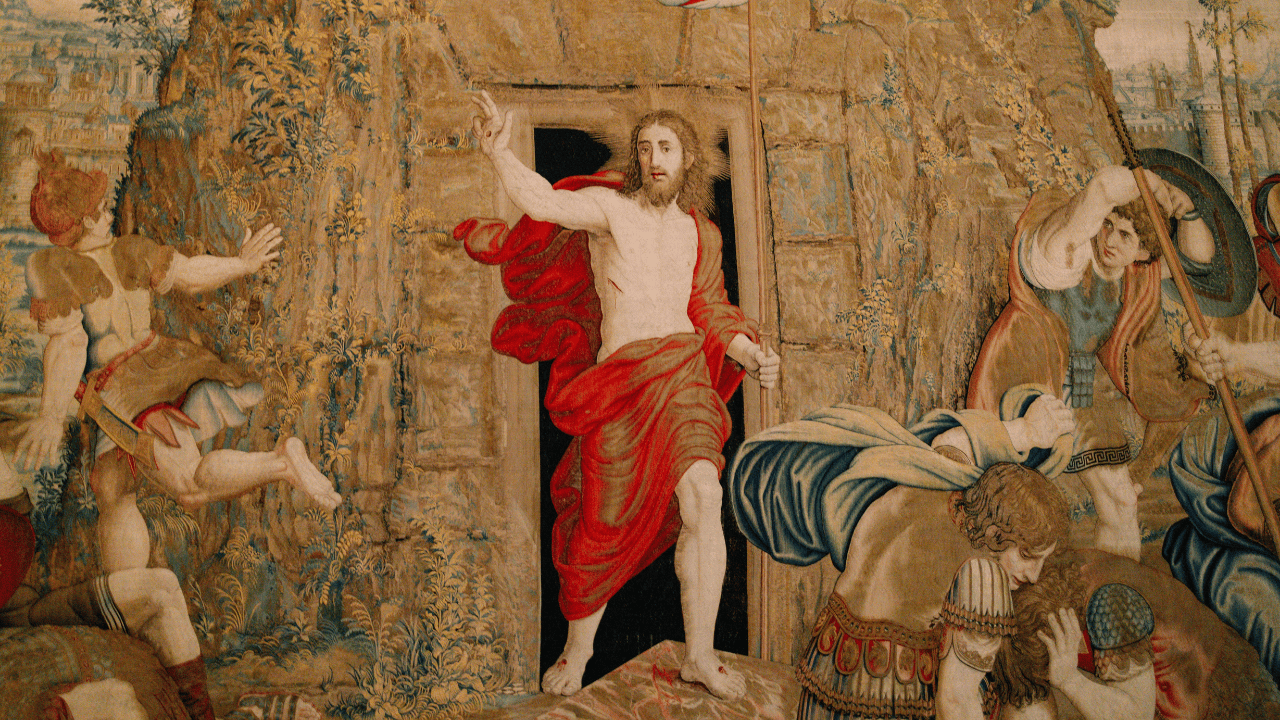
The resurrection is Christianity’s central claim. If it did not happen, as Paul recognizes, “ we are of all people most to be pitied.” Yet to Jesus biographers, Matthew, Mark, Luke and John, there was no doubting the reality of the resurrection. Each paints a different picture of its meaning. To Matthew, the resurrection is the cosmic vindication of Jesus claims of divinity and his place as messiah. Matthew takes aim at Jewish skeptics and rulers. Mark is concerned with the bewilderment and mystery of the empty tomb. Luke is concerned the Jesus connection to fulfilled Old Testament prophesy. John wants us to see the resurrected Lord’s compassion as he interacts with the nascent faith of his troubled disciples. The point of these narratives, and Paul’s commentary later, is that the resurrection is profound and its scope perhaps beyond our immediate comprehension.

